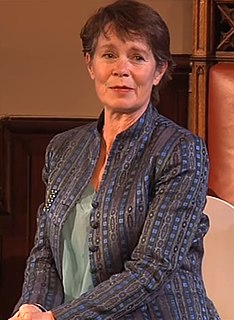A Quote by Charlotte Perkins Gilman
The mother as a social servant instead of a home servant will not lack in true mother duty. From her work, loved and honored though it is, she will return to her home life, the child life, with an eager, ceaseless pleasure, cleansed of all the fret and fraction and weariness that so mar it now.
Related Quotes
Those who think that a woman detained at home by her little family is doing nothing, think the reverse of what is true. Scarcely can the godly mother quit her home for a place of worship; but dream not that she is lost to the work of the church; far from it, she is doing the best possible service for her Lord. Mothers, the godly training of your offspring is your first and most pressing duty.
Her [Eleanor Roosevelt] father was the love of her life. Her father always made her feel wanted, made her feel loved, where her mother made her feel, you know, unloved, judged harshly, never up to par. And she was her father's favorite, and her mother's unfavorite. So her father was the man that she went to for comfort in her imaginings.
Every act of motherhood contains a dual intent, as the mother holds the child close and prepares it to move way from her, as she supports the child and stands it firmly on its own feet, and as she guards it against danger and sends it out across the yard, down by the stream, and across the traffic-crowded highway. Unless a mother can do both - gather her child close and turn her child out toward the world - she will fail in her purpose.
One thing I did have under my belt was, my mother lost her mother when she was 11. She mourned her mother her whole life and made my grandmother seem present even though I never met her. I couldn't imagine how my mom could go on but she did, she took care of us, she worked two jobs and had four children. She was such a good example of how to conduct oneself in a time of grief. When I lost my husband, I tried to model myself as much as I could on her.
God bless my mother - she's long gone now, but she'd work all day and go to school at night. She started out in life as a housekeeper at 15 years old, totally on her own, and she retired as a college professor. But there were some hard times. It's not easy for a woman who's only trying to do the best for her kid but who could never be home.
My mother didn't feel sorry for herself, she was left with no child support, no alimony at a very young age, with a child to raise, a high school education and she just figured it out. She didn't complain, she didn't rely upon government, she relied upon her own skill set, her own self confidence, her own drive in moxie and her own duty to me and her and she relied upon her family and her faith.
If I look back, my mother was always out. I can remember the perfume and her scarlet chiffon dress and crystal beads, going to a party. She used to play her violin at restaurants later on in life and at old people's homes. She loved the races, which she used to take me to as a child: our carpets were bought with her winnings. Loved her chickens.
She had sacrificed her childhood to save her brothers; she loved her family above all else, and her spirits yearned to return home once more, to the wild forest and the land of mystic tales and ancient spirits whence he had taken her. That was the place of her heart, and if he loved her, he must let her go.
She told her therapist it reminded her of coming home the summer after her freshman year at Rutgers, stepping back into the warm bath of family and friends, loving it for a week or two, and then feeling trapped, dying to return to school, missing her roommates and her cute new boyfriend, the classes and the parties and the giggly talks before bed, understanding for the first time that that was her real life now, that this, despite everything she'd ever loved about it, was finished for good.
As a teenage daughter hears her sweet mother plead unto the Lord that her daughter will be inspired in the selection of her companions, that she will prepare herself for a temple marriage, don't you believe that such a daughter will seek to honor this humble, pleading petition of her mother, whom she so dearly loves?
My mother had a life-altering stroke when I was nineteen and she died when I was twenty-three. I'm now older than my mother when she died and my relationship with her has really changed over these many years. I continue to stay interested in her and I know her differently now. Losing my mother, losing dear friends, is now part of the fabric of my being alive. And the fabric keeps changing, which is interesting.







































